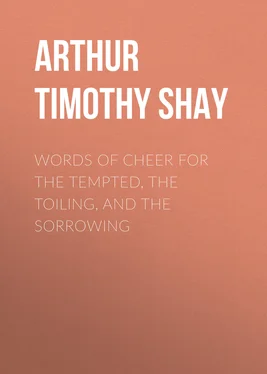Timothy Arthur - Words of Cheer for the Tempted, the Toiling, and the Sorrowing
Здесь есть возможность читать онлайн «Timothy Arthur - Words of Cheer for the Tempted, the Toiling, and the Sorrowing» — ознакомительный отрывок электронной книги совершенно бесплатно, а после прочтения отрывка купить полную версию. В некоторых случаях можно слушать аудио, скачать через торрент в формате fb2 и присутствует краткое содержание. Жанр: foreign_sf, literature_19, foreign_antique, foreign_prose, на английском языке. Описание произведения, (предисловие) а так же отзывы посетителей доступны на портале библиотеки ЛибКат.
- Название:Words of Cheer for the Tempted, the Toiling, and the Sorrowing
- Автор:
- Жанр:
- Год:неизвестен
- ISBN:нет данных
- Рейтинг книги:3 / 5. Голосов: 1
-
Избранное:Добавить в избранное
- Отзывы:
-
Ваша оценка:
- 60
- 1
- 2
- 3
- 4
- 5
Words of Cheer for the Tempted, the Toiling, and the Sorrowing: краткое содержание, описание и аннотация
Предлагаем к чтению аннотацию, описание, краткое содержание или предисловие (зависит от того, что написал сам автор книги «Words of Cheer for the Tempted, the Toiling, and the Sorrowing»). Если вы не нашли необходимую информацию о книге — напишите в комментариях, мы постараемся отыскать её.
Words of Cheer for the Tempted, the Toiling, and the Sorrowing — читать онлайн ознакомительный отрывок
Ниже представлен текст книги, разбитый по страницам. Система сохранения места последней прочитанной страницы, позволяет с удобством читать онлайн бесплатно книгу «Words of Cheer for the Tempted, the Toiling, and the Sorrowing», без необходимости каждый раз заново искать на чём Вы остановились. Поставьте закладку, и сможете в любой момент перейти на страницу, на которой закончили чтение.
Интервал:
Закладка:
Manufactures, trades, and all the subordinate arts and occupations that keep the car of civilization in motion, may be to you machines moving with a monotonous and unmeaning buzz, or they may be like Ezekiel's vision of wheels involved in wheels, that were lifted up from the earth by the power of the living creature that was in them.
Grumbling man or woman, life is a treadmill to you, because you look doggedly down and see nothing but the dull steps you take. If you would cease grumbling, and look up, your life would be transformed into a Jacob's ladder, and every step onward would be a step upward too. And even if it were a treadmill, to which you and other mortals were condemned for past offences, a kindly sympathy for your fellow-prisoners could carpet the way with velvet, and you might move on smilingly together, as through the mazes of an easy dance.
It is of no use to preach the old sermon of contentment with one condition, whatever it may be, a sermon framed for lands where aristocracies are fixtures, in this generation and on this continent. Discontent is a necessity of republicanism, until the millennium comes.
Yet it is not sensible to complain of the present, until we have gleaned its harvests and drained its sap, and it has become capital for us to draw upon in the future. Most of the dissatisfied grumblers of our day are like children from whom the prospect of a Christmas pie, intended for the climax of a supper, takes away all relish for the more solid and wholesome introductory exercises of bread and butter.
What is it we would have our life? Not princely pop and equipments, nor to "marry the prince's own," which used to form the denouement of every fairy tale, will suffice us now; for every ingenious Yankee school-boy or girl has learned to dissect the puppet show of royalty, and knows that its personages move in a routine the most hampered and helpless of all.
The honour of being four years in stepping from one door of the "White House" to the other, ceases to be the meed of a dignified ambition when it results from a skilful shuffling of political cards, rather than from strength and steadiness of head and an upright gait.
If we ask for freedom from care, and leisure to enjoy life—until we have learned, through the discipline of labour and care, how to appreciate and use leisure—we might as well petition from government a grant of prairie land for Egyptian mummies to run races upon.
If one might get himself appointed to the general overseership of the solar system, still, what would his occupation be but a regular pacing to and fro from the sun to the outermost limits of Le Verrier's calculations, and perhaps a little farther? A succession of rather longish strides he would have to take, to be sure; now burning his soles in the fires of Mercury; now hitting his corns against some of the pebbly Asteroids, and now slipping upon the icy rim of Neptune. Still, if he made drudgery of his work by keeping his soul out of it, he would only have his treadmill life over again, on a large scale.
The monotony of our three-score years and ten is wearisome to us; what can we think then of the poor planets, doomed to the same diurnal spinning, the same annual path, for six thousand years, to our certain knowledge? And, if telescopes tell us the truth, the universe is an ever-widening series of similar monotonies.
Yet space is ample enough to give all systems variety of place. While each planet moves steadily along on the edge of its plane, the whole solar equipage is going forward to open a new track on the vast highway of the heavens.
We too, moving in our several spheres with honest endeavours and aspirations, are, by the stability of our motions, lifting and being lifted, with the whole compact human brotherhood, into a higher elevation, a brighter revelation of the Infinite, the Universe of Wisdom and Love.
And in this view, though our efforts be humble and our toil hard, life can never be a treadmill.
ARTHUR LELAND
ARTHUR LELAND was a young lawyer of some twenty-seven years of age. His office stood a stone's throw from the court-house, in a thriving town in the West. Arthur had taken a full course in a Northern college, both in the collegiate and law department, and with some honour. During his course he had managed to read an amazing amount of English literature, and no man was readier or had a keener taste in such things than he. He had a pleasing personal appearance, a fluent and persuasive manner, an unblemished character. Every morning he came to his office from one of the most pleasant little cottage homes in the world; and if you had opened the little front gate, and gone up through the shrubbery to the house, you would have seen a Mrs. Leland, somewhere in-doors, and she as intelligent and pleasant a lady as you ever saw. You would have seen, moreover, tumbling about the grass, or up to the eyes in some mischief, as noble-looking a little fellow of some three years old as you could well have wished for your own son.
This all looks well enough, but there is something wrong. Not in the house. No; it is as pleasant a cottage as you could wish—plenty of garden, peas and honeysuckles climbing up everywhere, green grass, white paint, Venetian blinds, comfortable furniture.
Not in Willie, the little scamp. No; rosy, healthy, good head, intelligent eyes, a fine specimen he was of an only son. Full of mischief, of course, he was. Overflowing with uproar and questions and mischief. Mustachios of egg or butter-milk or molasses after each meal, as a matter of course. Cut fingers, bumped forehead, torn clothes, all day long. Yet a more affectionate, easily-managed child never was.
The mischief was not in Lucy, the Mrs. Leland. I assure you it was not. Leland knew, to his heart's core, that a lovelier, more prudent, sensible, intelligent wife it was impossible to exist. Thrifty, loving, lady-like, right and true throughout.
Where was this mischief? Look at Leland. He is in perpetual motion. Reading, writing, walking the streets, he is always fast, in dead earnest. Somewhat too fast. There is a certain slowness about your strong man. You never associate the idea of mental depth and power with your quick-stepping man. You cannot conceive of a Roman emperor or a Daniel Webster as a slight, swift man. The bearing of a man's body is the outward emblem of the bearing of his soul. Leland is rather slight, rather swift. He meets you in his rapid walk. He stops, grasps your hand, asks cordially after your health. There is an open, warm feeling in the man. No hypocrisy whatever. Yet he talks too fast. He don't give you half a chance to answer one of his rapid questions, before he is asking another totally different. He is not at ease. He keeps you from being at ease. You feel it specially in his house. He is too cordial, too full of effort to make your visit pleasant to you. You like him, yet you don't feel altogether at home with him. You are glad when he leaves you to his more composed wife. You never knew or heard of his saying or doing anything wrong or even unbecoming. You look upon him as a peculiar sort of man—well, somehow—but! He is at the bar defending that woman, who sits by him, dressed in mourning—some chancery case. Or it is a criminal case, and it is the widow's only son that Leland is defending. If you had been in his office for the last week, you would have acknowledged that he has studied the case, has prepared himself on it as thoroughly as a man can. He is an ambitious man. He intensely desires to make for himself a fortune and a position. His address to the judge, or to the jury, as the case may be, is a good one. Yet, somehow, he does not convince. He himself is carried away by his own earnestness, but he does not carry away with him his hearers. His remarks are interesting. People listen to him from first to last closely. Yet his arguing does not, somehow, convince. His pathos does not, somehow, melt. He is the sort of man that people think of for the Legislature. No man ever thinks of him in connexion with the Supreme Bench or Senate.
Читать дальшеИнтервал:
Закладка:
Похожие книги на «Words of Cheer for the Tempted, the Toiling, and the Sorrowing»
Представляем Вашему вниманию похожие книги на «Words of Cheer for the Tempted, the Toiling, and the Sorrowing» списком для выбора. Мы отобрали схожую по названию и смыслу литературу в надежде предоставить читателям больше вариантов отыскать новые, интересные, ещё непрочитанные произведения.
Обсуждение, отзывы о книге «Words of Cheer for the Tempted, the Toiling, and the Sorrowing» и просто собственные мнения читателей. Оставьте ваши комментарии, напишите, что Вы думаете о произведении, его смысле или главных героях. Укажите что конкретно понравилось, а что нет, и почему Вы так считаете.












